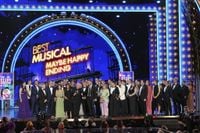On June 8, 2025, the Korean original musical Maybe Happy Ending captivated the world’s theater community by sweeping the 78th Tony Awards held at New York’s Radio City Music Hall. This groundbreaking production clinched six prestigious awards, including Best Musical, Best Book of a Musical, Best Original Score, Best Direction, Best Lead Actor, and Best Scenic Design, marking a historic moment for Korean theater on the global stage.
Co-created by writer Park Cheon-hyu and American composer Will Aronson, Maybe Happy Ending tells a heartfelt story set in late 21st century Seoul. It follows the love and journey of two helper robots, Oliver and Claire, who were abandoned by humans but find connection and affection in each other. This unique and touching narrative, combined with a fresh setting and delicate emotional depth, has won acclaim both domestically and internationally.
The musical’s journey began in 2014 through a development program by the Wooreun Cultural Foundation. Its first performance took place in 2016 at a modest 300-seat theater in Seoul’s Daehangno district, where it quickly garnered positive reviews for its imaginative concept and emotional resonance. The leap to the international stage was catalyzed by a 2016 showcase in New York, where renowned producer Jeffrey Richards took notice, leading to a Broadway contract.
In November 2024, Maybe Happy Ending officially opened at the Belasco Theatre in Manhattan, New York. Since then, it has enjoyed tremendous success, with ticket sales surpassing $1 million for two consecutive weeks, signaling strong and stable audience interest. The production’s triumph on Broadway is not just a commercial victory; it represents a significant milestone as Korean creators and producers fully integrate into the American theater production system.
Park Cheon-hyu’s win for Best Book of a Musical is especially historic, as he became the first Korean to receive a Tony Award in this category. Alongside Aronson, who shared the Best Original Score award, their collaboration has been celebrated for its originality and heartfelt storytelling. The musical was also the only original work among the five nominees for Best Musical, underscoring its unique voice amid Broadway’s competitive landscape.
Before the Tony Awards, Maybe Happy Ending had already made waves by sweeping major honors at other prestigious ceremonies. On June 2, 2025, it won six awards at the 69th Drama Desk Awards, including Best Musical, Direction, Music, Lyrics, Book, and Scenic Design. It also secured top prizes at the Drama League Awards and the Outer Critics Circle Awards, further cementing its status as a critical darling.
The Tony Awards themselves, often dubbed the "Oscars of the performing arts," are determined by anonymous votes from approximately 840 industry professionals. This peer recognition highlights the musical’s exceptional craftsmanship and storytelling. The six awards it garnered at the ceremony represent the most won by any show this year, a testament to its widespread acclaim.
This success follows last year’s breakthrough for Korean musicals on Broadway, when The Great Gatsby won a Tony for Costume Design. However, Maybe Happy Ending has raised the bar by not only winning multiple awards but also by achieving sustained commercial and critical success, signaling a new era for Korean musical theater internationally.
Critics and audiences alike have drawn parallels between Maybe Happy Ending and the global impact of the Korean film Parasite, seeing the musical as a cultural ambassador that could similarly elevate Korean performing arts on the world stage. Its innovative narrative about robots exploring love and humanity resonates universally, blending futuristic themes with deeply human emotions.
Moreover, the musical’s success is significant in that it transcends the traditional limitations faced by previous Korean productions abroad. Earlier Korean musicals like Empress Myeongseong in 1997 and Hero in 2011 had limited runs and relied heavily on Korean diaspora audiences. In contrast, Maybe Happy Ending has established itself firmly within the mainstream Broadway scene, attracting a diverse and broad audience.
The story of Oliver and Claire, helper robots designed to assist humans, reflects contemporary questions about technology, companionship, and what it means to be alive. Their love story, set against a futuristic Seoul, offers a poignant exploration of connection in an increasingly mechanized world. This blend of sci-fi and romance, coupled with exquisite music and staging, has captivated theatergoers and critics alike.
Park Cheon-hyu and Will Aronson’s partnership exemplifies a successful cross-cultural collaboration, combining Korean storytelling sensibilities with American musical theater expertise. This synergy has delivered a work that feels fresh yet accessible, intimate yet expansive, and it has clearly struck a chord on Broadway.
As the musical continues its run at the Belasco Theatre, its influence is expected to ripple through both the Korean and American theater industries. It signals growing opportunities for Korean artists to participate fully in global cultural exchanges and to present their stories on the world’s most prestigious stages.
In a year marked by fierce competition among musicals, Maybe Happy Ending stands out not only for its artistic achievements but also for its symbolic significance. It represents a new chapter for Korean performing arts, one where local creativity meets global recognition and where stories once confined to a national audience find universal resonance.
With six Tony Awards and a slew of other accolades under its belt, Maybe Happy Ending has proven that Korean musicals can compete and triumph on Broadway’s grandest stages. It’s a triumph born from years of dedication, innovation, and cross-cultural collaboration—a true celebration of the power of storytelling.


